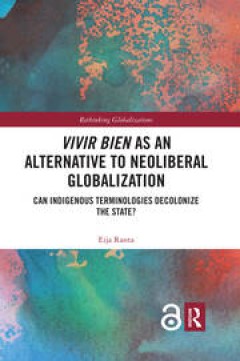Filter by

Democracy and Climate Change
Democracy and Climate Change explores the various ways in which democratic principles can lead governments to respond differently to climate change. The election cycle can lead to short-termism, which often appears to be at odds with the long-term nature of climate change, with its latency between cause and effect. However, it is clear that some democracies deal with climate change better than …
- Edition
- -
- ISBN/ISSN
- 9781315228983
- Collation
- -
- Series Title
- -
- Call Number
- -

Rampage Shootings and Gun Control: Politicization and Policy Change in Wester…
While the causes of rampage violence have been analysed thoroughly in diverse academic disciplines, we hardly know anything about the factors that affect their consequences for public policy. This book addresses rampage shootings in Western Europe and their conditional impact on politicization and policy change in the area of gun control. The author sets out to unravel the factors that facilit…
- Edition
- -
- ISBN/ISSN
- 9781315209425
- Collation
- -
- Series Title
- -
- Call Number
- -

Vivir Bien as an Alternative to Neoliberal Globalization : Can Indigenous Ter…
Presenting an ethnographic account of the emergence and application of critical political alternatives in the Global South, this book analyses the opportunities and challenges of decolonizing and transforming a modern, hierarchical and globally-immersed nation-state on the basis of indigenous terminologies. Alternative development paradigms that represent values including justice, pluralism,…
- Edition
- -
- ISBN/ISSN
- 9781315180441
- Collation
- -
- Series Title
- -
- Call Number
- 320

Empowering Adolescent Girls in Developing Countries Gender Justice and Norm C…
Adolescence is a pivotal time in a girl's life. The development of educational, physical, psychosocial, familial, political and economic capabilities enable girls to reach their full potential and contribute to the wellbeing of their families and society. However, progress is still significantly constrained by discriminatory gender norms and the related attitudes and practices which restrict gi…
- Edition
- -
- ISBN/ISSN
- 9781315180250
- Collation
- -
- Series Title
- -
- Call Number
- -

Noncitizenism: Recognising Noncitizen Capabilities in a World of Citizens
Noncitizens have always been present in liberal political philosophy. Often hard to situate within traditional frameworks that prioritise citizenship, noncitizens can appear voiceless and rightsless, which has implications for efforts towards global justice and justice in migration. This book proposes an alternative. Noncitizenism identifies an analytical category of noncitizenship. While main…
- Edition
- -
- ISBN/ISSN
- 9781315169736
- Collation
- -
- Series Title
- -
- Call Number
- -

African Border Disorders: Addressing Transnational Extremist Organizations
Since the end of the Cold War, the monopoly of legitimate organized force of many African states has been eroded by a mix of rebel groups, violent extremist organizations, and self-defence militias created in response to the rise in organized violence on the continent. African Border Disorders explores the complex relationships that bind states, transnational rebels and extremist organizations…
- Edition
- -
- ISBN/ISSN
- 9781315166483
- Collation
- -
- Series Title
- -
- Call Number
- -

1989 and the West: Western Europe since the End of the Cold War
Back in 1989, many anticipated that the end of the Cold War would usher in the ‘end of history’ characterized by the victory of democracy and capitalism. At the thirtieth anniversary of this momentous event, this book challenges this assumption. It studies the most recent era of contemporary European history in order to analyse the impact, consequences and legacy of the end of the Cold War …
- Edition
- -
- ISBN/ISSN
- 9781315146355
- Collation
- -
- Series Title
- -
- Call Number
- -

Place Branding and Marketing from a Policy Perspective
As part of an emerging literature on place branding, this book fills the important gap between practice-oriented literature—which lacks in-depth and critical analysis—and technical academic literature—which tends to miss down-to-earth practitioners' concerns and to overlook policy and political contexts. Providing frameworks and knowledge on how to practice place branding effectively, thi…
- Edition
- 1st Edition
- ISBN/ISSN
- 9781003286189
- Collation
- -
- Series Title
- -
- Call Number
- -

Authoritarian Populism and Bovine Political Economy in Modi’s India
Authoritarian Populism and Bovine Political Economy in Modi’s India analyses how the twin forces of Hindu nationalism and neoliberalism unfold in India’s bovine economy, revealing their often-devastating material and economic impact on the country’s poor. This book is a rare, in-depth study of India’s bovine economy under Narendra Modi’s authoritarian populism. This is an economy tha…
- Edition
- -
- ISBN/ISSN
- 9781032709406
- Collation
- -
- Series Title
- -
- Call Number
- -

Disability, Happiness and the Welfare State :Finland and the Nordic Model
This book looks at disability as an evolving social phenomenon. Disability is created through the interaction between persons with impairments and their environment. Exploring these experiences of persons with disabilities and discussing universality and particularity in our understanding of assumed development and normalcy, it takes Finland, which has been chosen repeatedly as the happiest co…
- Edition
- -
- ISBN/ISSN
- 9781032685519
- Collation
- -
- Series Title
- -
- Call Number
- -
 Computer Science, Information & General Works
Computer Science, Information & General Works  Philosophy & Psychology
Philosophy & Psychology  Religion
Religion  Social Sciences
Social Sciences  Language
Language  Pure Science
Pure Science  Applied Sciences
Applied Sciences  Art & Recreation
Art & Recreation  Literature
Literature  History & Geography
History & Geography